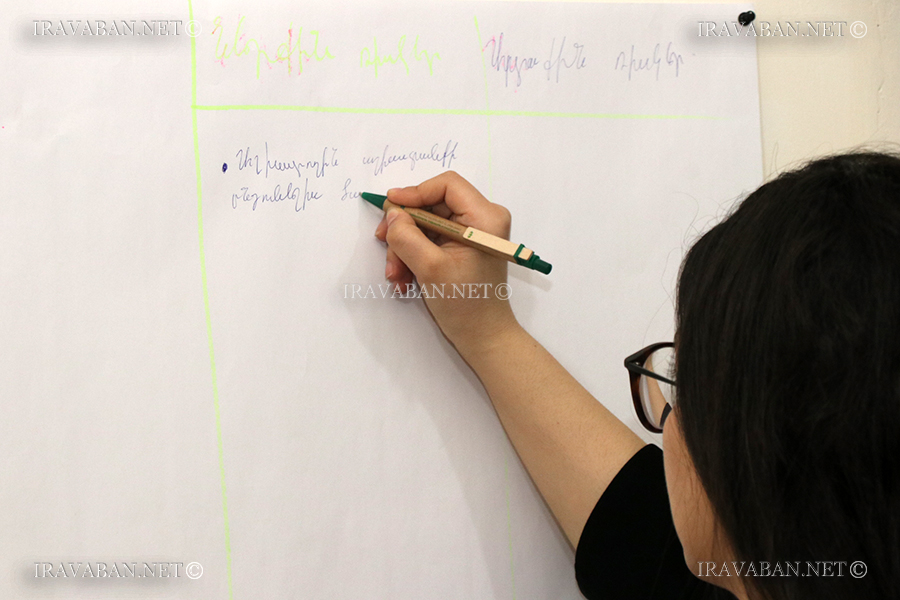On 11 March, the Armenian Lawyers’ Association (ALA) organized a training on “Ant-Corruption Compliance in Business” for the representatives of Small and Medium Business Companies working in Vanadzor in the scope of the “Armenia: Promoting Anti-Corruption Conduct and Reforms” Project.
The Project is implemented by the “Centre for International Private Enterprise”, the “Armenian Lawyers’ Association” NGO, the “Corporate Governance Centre” NGO and the “Yerevan Chamber of Commerce and Industry” with financial support of the National Endowment for Democracy. Notably, the objective of the project is to combat corruption in the business sector, to introduce the Anti-Corruption Compliance Standards within the Armenian business community, and implementing Anti-Corruption Compliance Programs in SMEs.
The Training started with the welcoming speech by Ms Zarine Hovhannisyan, Lawyer, Head of Vanadzor branch of the Armenian Lawyers’ Association, who raised the importance of anti-corruption compliance in the light of creation of a more favourable business environment in Lori region.
In the interview with us, Ms Mariam Zadoyan, Project Manager of the ALAs Component of “Armenia: Promoting Anti-Corruption Conduct and Reforms” Project said that it is necessary to conduct a lot of work with the representatives of the business sector for them to understand the importance of the fight against corruption as well as the reporting the corruption manifestations.
According to her, most of the participants had no idea about the anti-corruption compliance program. “During the first practical assignment of the course, the participants did not show much interest, which was the result of their uncertainty. In the second part of the training, when they had some idea about the program, they brought examples and problems,” Mariam Zadoyan said.
According to project expert Lusine Nalbandyan, business representatives initially expressed the opinion that changes should be made at the legislative level. According to them, today there is a need for a number of tax and legal regulations in the business environment, so the state should focus first on these sectoral issues, and then contribute to the deepening of anti-corruption education. “In the beginning the representatives of the business sector addressed the anti-corruption compliance program with reservation, and wondered whether it is necessary in practice. However, when we presented that the program was aimed at improving the business environment, establishing long-term partnerships and business ties, raising the reputation of the organization and gaining international partners, their interest increased,” Lusine Nalbandyan added.
Trainers presented what corruption is, its manifestations, explained what the anti-corruption compliance is, and the impact it may have on the company’s activities.
Ms Tatevik Aghazaryan, representing the private entrepreneur “Emma Arakelyan”, said she was engaged in business of grocery store. According to her, they had not faced serious corruption issues yet. “Such programs in Armenia in general are really good, but currently it could hardly have great efficiency in our business. May be in the future, it would be necessary to apply it in our organization,” Tatevik Aghazaryan said.
Lusia Baratyan, head of the “Lucia Food” organisation, noted that they constantly face corruption issues related with the development of market. “The problem is that large companies are pressing upon the small companies both in terms of financial, price policy and competition. I would definitely say that I want to have the anti-corruption compliance program introduced in my company. The more such programs are, the more developed the country will be. In the case of introducing this system, organizations will not apply such type of practices to each other,” she said.
As the organization operates not only for the production of semi-finished products, it also provides buffet service, as well as organises trainings. According to Lusine Baratyan, their trainings will also focus on corruption in the future. “The more informed are people, the more protected they will be. Everyone must be aware of the laws to be able to protect personal rights even when signing contracts with the employees,” she said.
Gayane Khachatryan, the head of “Apricot” Company, noted that the company is a social entrepreneurship as well and some of the 40 employees are disabled people. There is no anti-corruption compliance program in the organization, and employees are not aware of the topic. “The program, if my business expands, will promote development, I would like to introduce it. I have come to the training to make an idea about the program and to understand whether it is necessary for me or not. This organization is engaged in the production of wooden souvenirs, silver jewellery, Armenian tea, chocolate, which is sold in a number of stores. “It’s a very difficult and complicated process to work with shops and collaborate. There is a problem especially with regard to the types of taxes. There are shops that do not work with certain types of taxes.
According to the participants, the unemployment in Vanadzor also leads to manifestations of corruption, as people are trying to get employed in this or that organization through mediators, or as a result of some services provided. Corruption elements are often encountered while engaging in commercial activities.
It is worth mentioning that during the training participants completed tests, which included a number of questions about corruption schemes, anti-corruption compliance program, information on which is provided during the whole course. At the end of the training, the participants completed the same test for the second time to compare what knowledge they gained from the course. Participants also had groupworks on raising corruption risks in their businesses and devolooping risk prevention plans.
This material has been prepared in the scope of the “Armenia: Promoting Anti-Corruption Conduct and Reforms” Project implemented by the “Centre for International Private Enterprise”, the “Armenian Lawyers’ Association” NGO, the “Corporate Governance Centre” NGO and the “Yerevan Chamber of Commerce and Industry” with financial support of the National Endowment for Democracy. The contents of this material are the sole responsibility of the “Armenian Lawyers’ Association” NGO and can in no way be taken to reflect the views of the National Endowment for Democracy.










